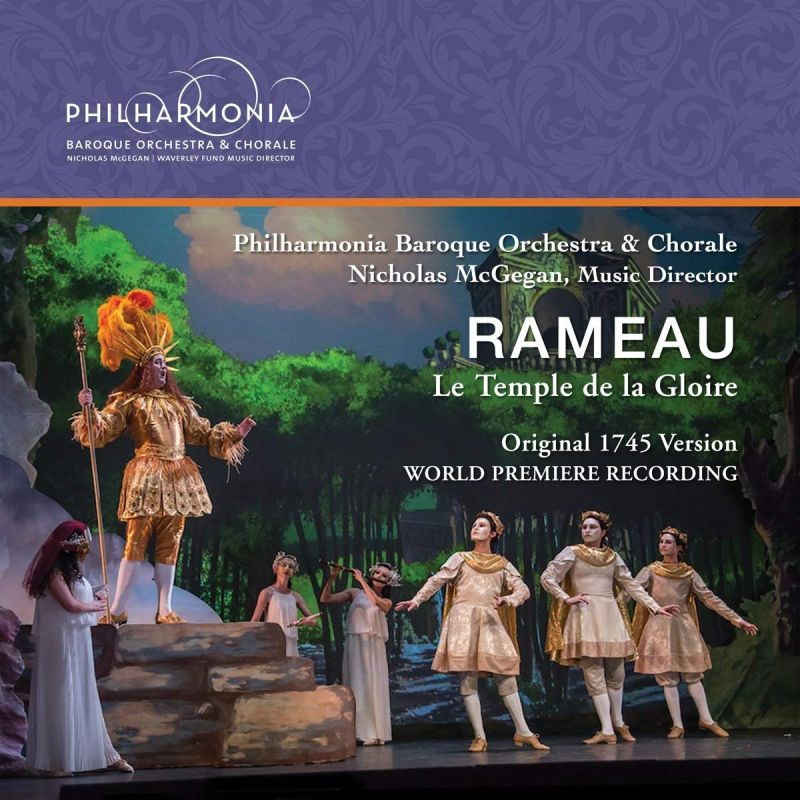RAMEAU Le Temple de la Gloire (McGegan)
View record and artist detailsRecord and Artist Details
Composer or Director: Jean-Philippe Rameau
Genre:
Opera
Label: PBP
Magazine Review Date: 09/2018
Media Format: CD or Download
Media Runtime: 147
Mastering:
DDD
Catalogue Number: PBP10

Tracks:
| Composition | Artist Credit |
|---|---|
| (Le) temple de la gloire |
Jean-Philippe Rameau, Composer
Aaron Sheehan, Apollon; Trajan, Haute-Contre Artavazd Sargsyan, Bacchus, Haute-Contre Camille Ortiz, Shepherdess; Érigone; Roman Lady, Soprano Chantal Santon-Jeffery, Lydie; Bacchante; La Gloire, Soprano Gabrielle Philiponet, Arsine; Priestess; Plautine, Soprano Jean-Philippe Rameau, Composer Marc Labonnette, Envy; Shepherd; High Priest, Baritone Nicholas McGegan Philharmonia Baroque Chorale Philharmonia Baroque Orchestra Philippe-Nicolas Martin, Bélus; Warrior, Baritone Tonia d’Amelio, Fannie, Soprano |
Author: Richard Lawrence
In the Prologue, Envy attacks the Temple of Glory, only to be defeated and chained up by forces led by Apollo. Three acts follow. In the first, king Bélus is turned away from the temple on account of his cruelty; the second act sees Bacchus also denied admission. Only the emperor Trajan is rewarded, for his magnanimity in battle; and he asks La Gloire to turn the Temple of Glory into a Temple of Happiness. A downbeat way of honouring a victorious monarch, and it’s not surprising that Louis is said to have treated Voltaire with a certain froideur.
The score comprises the usual mixture of solos, choruses and dances. It is not, I would say, vintage Rameau: too many numbers in triple time makes for monotony. The Philharmonia Baroque Orchestra under Nicholas McGegan play beautifully; the dancers are surprisingly quiet, but there is much applause. Some of the solo singing is, frankly, disappointing. The baritone Marc Labonnette makes little of Envy’s opening ‘Profonds abîmes de Ténare’. As Bacchus, Artavazd Sargsyan makes brave attempts at top D and C (sounding a semitone lower), but he sounds strained. So does Aaron Sheehan as Apollo; he is in much better voice as Trajan. The sopranos, led by Chantal Santon-Jeffery and Gabrielle Philiponet, are fine.
The printed libretto and translation shows a lack of care: words differ from what is sung, lines are missing. And, even if Envy was performed in drag, the translation shouldn’t refer to him as ‘she’ when the French pronoun is masculine. The booklet includes production photos showing the characters dressed in sumptuous 18th-century costumes: a DVD would have been splendid.
Discover the world's largest classical music catalogue with Presto Music.

Gramophone Digital Club
- Digital Edition
- Digital Archive
- Reviews Database
- Full website access
From £8.75 / month
Subscribe
Gramophone Full Club
- Print Edition
- Digital Edition
- Digital Archive
- Reviews Database
- Full website access
From £11.00 / month
Subscribe
If you are a library, university or other organisation that would be interested in an institutional subscription to Gramophone please click here for further information.




